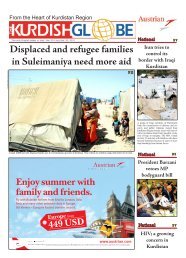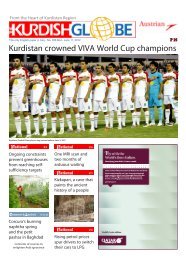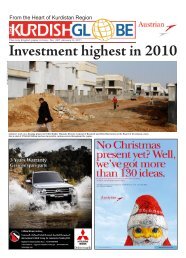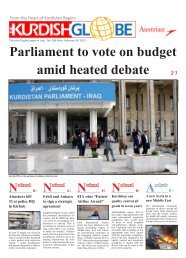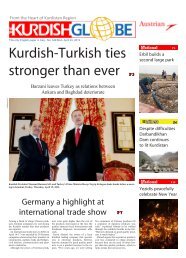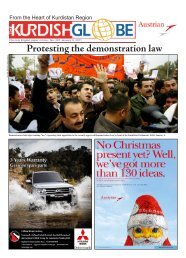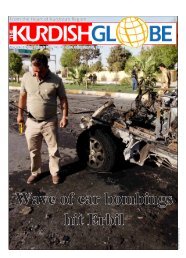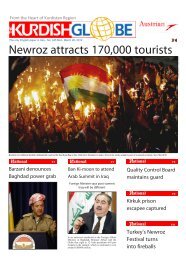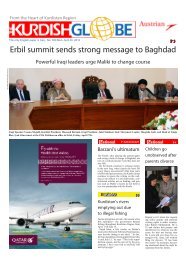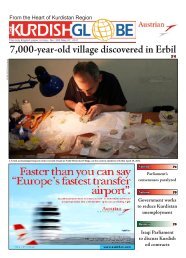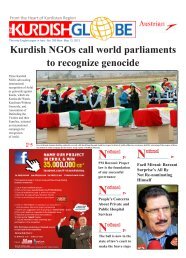From the Heart of Kurdistan Region - Kurdish Globe
From the Heart of Kurdistan Region - Kurdish Globe
From the Heart of Kurdistan Region - Kurdish Globe
- No tags were found...
Create successful ePaper yourself
Turn your PDF publications into a flip-book with our unique Google optimized e-Paper software.
The <strong>Kurdish</strong> <strong>Globe</strong> No. 370, Tuesday, October 02, 2012 6The <strong>Kurdish</strong> <strong>Globe</strong> No. 370, Tuesday, October 02, 2012 7Sheikhalla, a market full <strong>of</strong> violationsHe drops his head intohis hands and peers outfrom behind his fingers.It isn’t a half-witgesture, perhaps he istrying to mock whenasked how much hemakes per month. Heclears his throat as ifbraced for a toughcompetition andstates “Everybody in<strong>Kurdistan</strong> has amagic wandfor money!”I, pivot my shoulders to <strong>the</strong>wooden chair in a café, where allpeople seem to have fun, shrugand ask what does “magic wand”mean here? He slurs <strong>the</strong> lastwords a little, like a speaker justgetting started, “It means thateverybody everywhere in <strong>Kurdistan</strong>makes money easily -morethan enough.”He is sodden with hope. GhafourSoran, a taxi driver fromErbil, <strong>the</strong> capital <strong>of</strong> <strong>Kurdistan</strong>,is not in a propertied class but amiddle class who makes $2000USD per month. He is married toa housewife who has no incomeat all. Toge<strong>the</strong>r <strong>the</strong>y raise threechildren. He owns a half-finishedhouse and tries his best to completehis house by <strong>the</strong> end <strong>of</strong> nextyear. He saves $1200 USD permonth.“I live like a king,” he stateswith a barking laugh and complainsa bit about <strong>the</strong> lack <strong>of</strong> basicservices in his neighborhoodsuch as <strong>the</strong> streets are not paved,<strong>the</strong>re are water and sewage shortagesas well as an absence <strong>of</strong>public parks, libraries, schoolsand hospitals.Throughout my interviews, Ihear different people in differentfields saying, <strong>the</strong> <strong>Kurdish</strong>boom is unprecedented. Inflationis rife. Average families make$2500-3500 a month. No cars,no goods, no fruit, no furniture isever stuck in <strong>the</strong> markets. Peoplebuy <strong>the</strong>m day in , day out. Yougo to a furniture store, all <strong>Kurdistan</strong>is <strong>the</strong>re to buy furniture. Youvisit <strong>the</strong> downtown; all peopleare <strong>the</strong>re shopping and moneyflies out <strong>of</strong> <strong>the</strong> hands <strong>of</strong> everyone. You go to <strong>the</strong> car shows,people are busy bargaining andbuying 2013 models and brandnew cars.Ako Khalid, an economist livingin <strong>Kurdistan</strong> with a doublecitizenship: <strong>Kurdish</strong> and German,states that <strong>Kurdistan</strong> is really“<strong>the</strong> land <strong>of</strong> money” and <strong>the</strong>Money rains in <strong>Kurdistan</strong>“The land <strong>of</strong> money and kingish Life”boom is at its peak.Though <strong>the</strong> price <strong>of</strong> real estateis more expensive than in Istanbul,Paris and even California,people still buy villas, lands androws <strong>of</strong> houses! One 200 metersquare house- two floors is worthone million USD in an undevelopeddistrict called Kalar in <strong>the</strong>south east <strong>of</strong> <strong>Kurdistan</strong>. One meter<strong>of</strong> land in Erbil hits five thousandUSD. These prices werenothing more than a dream somefive years ago in <strong>Kurdistan</strong>. AsKhalid says everything is up forgrabs in <strong>Kurdistan</strong> you just needto “put your trust in <strong>the</strong> rightpeople” and you can wake up <strong>the</strong>next day as a millionaire.<strong>Kurdistan</strong> has become also <strong>the</strong>land <strong>of</strong> big companies competingfor <strong>the</strong> consumers who don’tknow what it is like to taste localfruit, vegetables and o<strong>the</strong>r diets. For <strong>the</strong>m almost everything isimported from Turkey and Iranand some European and Gulfcountries. Pepsi and Coca Cola,Mercedes and Ford are goodexamples. And Chinese, Europeanand American oil firms beateach o<strong>the</strong>r very hard to sign oilcontracts with <strong>the</strong> <strong>Kurdistan</strong> <strong>Region</strong>alGovernment (KRG) andrush to get started. The funniestpart, and possibly <strong>the</strong> worst, isthat Macdonald hasn’t showedup yet in this big market wherethousands <strong>of</strong> families have dinneroutside. As Khalid says whenone sees <strong>the</strong> restaurants full all<strong>the</strong> time, even during brunchtimes it is easy to think that nobodyeats at home in <strong>Kurdistan</strong>.“And that’s a big sign that peoplehave money in this part <strong>of</strong> <strong>the</strong>world.”But Khalid thinks that thisboom is not robust in <strong>Kurdistan</strong>and “it might plunge soon” because<strong>the</strong>re is control over nothing.He terms <strong>the</strong> situation like“it’s a wild free market”.Both Soran’s sons and a daughter,go to school and this needsmoney, <strong>of</strong> course. He can manageall this only by <strong>the</strong> incomehe gets from his taxi. However,<strong>the</strong>re are people who are taxidrivers and at <strong>the</strong> same time areworking in public sectors too.Many policemen are taxi driversafter <strong>the</strong>y finish <strong>the</strong>ir shift oncall. You can find many teachers,civil servants, health staff, educationpersonnel and even headmasterswho own a taxi and workat <strong>the</strong>ir leisure. Everyone canbe a taxi driver for <strong>the</strong>re are noregulations, restrictions and ruleswhatsoever to prevent someonefrom being a taxi driver and havinga taxi. Khalid claims that thisis one <strong>of</strong> <strong>the</strong> conundrums <strong>of</strong> <strong>the</strong>whole boom because even villagersleave <strong>the</strong>ir villages and becometaxi drivers in <strong>Kurdistan</strong>.Soran says he will save money for <strong>the</strong> bad days after he finishes his house.A traffic policeman, on condition<strong>of</strong> anonymity, says that30 per cent <strong>of</strong> traffic staff havetaxis and work as taxi drivers after<strong>the</strong>ir formal work hours. Theleast monthly salary <strong>of</strong> a trafficpoliceman is $1200 USD. Hesays that he earns twice morethan his salary per month.The Public are not only taxidrivers. They own shops, minimarkets,buses, houses to rentand one can go down <strong>the</strong> unfinishedlist.Walid Khidir is a primaryschool teacher, at <strong>the</strong> same timehe owns a mini-market in a busyneighborhood in Duhok. Heearns more than $4,000 USDper month. He also says that helives like a king. As a matter <strong>of</strong>fact, through my interviews Ihear many people referring tothat “Kingish Life” <strong>the</strong>y have in<strong>Kurdistan</strong>. I eagerly ask Khalidto explain what is a “KingishLife” and how does it look liketo live like that. He wiggles andtakes several seconds to reorganizehis thoughts in ano<strong>the</strong>r caféwhere people seem happy in <strong>the</strong>irKingish outfits. The Kingish lifemeans to have best <strong>of</strong> best: bestcar, best house, best indoor, bestjob, at least one trip per year tooutside <strong>Kurdistan</strong>, ano<strong>the</strong>r housefor renting, whatever you wantyou can buy with what you earnmonthly.The Kings in <strong>Kurdistan</strong> stillcomplain about basic serviceslike water, bad roads, sewageshortages and o<strong>the</strong>rs. Khidirbuys water from <strong>the</strong> water tanks.“I buy 500 liters <strong>of</strong> water everyo<strong>the</strong>r day.” Soran used to buywater but recently <strong>the</strong> local governmenttackled <strong>the</strong> lack <strong>of</strong> waterand now he has water from <strong>the</strong>national pipelines.“You can manage all problemsif you have a good income,” heproudly states.O<strong>the</strong>rs think that <strong>the</strong> smallestand simplest move would makehundreds <strong>of</strong> US dollars. KarimHussein, ano<strong>the</strong>r economist andteacher <strong>of</strong> economy in a highschool in Suleimaniya, states that<strong>the</strong> reason behind <strong>the</strong> fact <strong>of</strong> havinggood incomes is that peoplehave more than one job. “Whateveryou do, how you move andwhat job you have can collect formore than three thousands permonth. And that’s for a middleclass family; for o<strong>the</strong>rs it is evenmore than that.”Both economists Khalid andHussein agree that <strong>the</strong> political,economic, social and businesstumble in Iraq is a big reasonwhy <strong>Kurdistan</strong>’s boom gets biggerand bigger every day.“It’s like blowing a balloon.One day it will burst and manywill badly fell down,” adds Husseinwith a serious look.Soran concludes by sayingthat after his house is built completely,he will start saving somemoney for <strong>the</strong> days after <strong>the</strong> balloonblows.Goran SabahGhafourErbillohangoran@yahoo.comGLOBE PHOTO/Goran SabahGLOBE PHOTO/Safin HamidWalking through <strong>the</strong>Sheikhalla Market, <strong>the</strong>most crowded marketin Downtown Erbil, onewould imagine that <strong>the</strong>reare no laws or regulationsin this area.Sewage water is beingmixed with garbage collectedon <strong>the</strong> street rightin front <strong>of</strong> a butcher shop.This produces an intolerableodor and hundreds <strong>of</strong>insects are attacking <strong>the</strong>meat in <strong>the</strong> shop as wellas <strong>the</strong> fruit and vegetablesin <strong>the</strong> grocery shop nextdoor.In this market, wherepeople shop mainly forfoodstuff and home necessities,and where all<strong>the</strong> foodstuff wholesalersare located, one cannotwalk easily, having to passthrough narrow openingsbetween cars, carriages,stuff showcased on <strong>the</strong>passageway and garbage.Most <strong>of</strong> <strong>the</strong> shop ownershave occupied <strong>the</strong> passagewayswith <strong>the</strong>ir productsand <strong>the</strong> streets with<strong>the</strong>ir cars. According toKarzan Mohammed Amin,a shop owner, <strong>the</strong> shopowners are competing onoccupying <strong>the</strong> largest part<strong>of</strong> <strong>the</strong> passageways with<strong>the</strong>ir wares.Not only are <strong>the</strong> passagewaysblocked, but also <strong>the</strong>street as well. Two rows <strong>of</strong>cars park on <strong>the</strong> right handside <strong>of</strong> <strong>the</strong> street and oneon <strong>the</strong> left, this is in additionto numerous carriageswhich are selling stuffon <strong>the</strong> street. The crowdreaches its peak late in <strong>the</strong>GLOBE PHOTO/Safin HamidA man walks past a pile <strong>of</strong> garbage in Sheikhalla, downtown Erbil.afternoon.Virtually everything issold in this market rangingfrom foodstuff, veggies,fruits, kitchenware,cleaning products, cloths,electrical fixtures, homeappliances, pipes, bicycles,motorcycles and manyo<strong>the</strong>r things. Even most <strong>of</strong><strong>the</strong> city’s money exchangeand money transfer <strong>of</strong>ficesare located in <strong>the</strong> heart <strong>of</strong>Sheikhalla.If monitoring committees<strong>of</strong> <strong>the</strong> health and municipalityministries passby this street, <strong>the</strong>y would,based on <strong>the</strong>ir regulationsand procedures, closedown all <strong>the</strong> shops due tonumerous violations andtrespasses.A street vendor who wasselling fruits on a carriageexpressed his gratitude towardsgovernment for allowingeveryone to do hisbusiness and earn somemoney. But a shop owner,on <strong>the</strong> o<strong>the</strong>r hand, seemedto be exhausted from all<strong>the</strong>se violations and crowdand said “violation alsohas a limit, but here it haspassed all limits.”One can rarely find agarbage container or evena plastic bag in any shopsand everybody throws <strong>of</strong>fhis/her garbage on <strong>the</strong>street, creating mountains<strong>of</strong> garbage by end <strong>of</strong> <strong>the</strong>day, while just metersfrom this different kinds <strong>of</strong>uncovered food are sold.Ano<strong>the</strong>r street vendorwas selling dairy productson <strong>the</strong> street in <strong>the</strong> sun andargued that no government<strong>of</strong>ficial has informed himthat dairy products shouldbe stored in a specific temperaturera<strong>the</strong>r than in <strong>the</strong>sun and in <strong>the</strong> dust.Rahman Hashim, a middle-agedman who was inSheikhalla to buy somefoodstuff, told <strong>the</strong> <strong>Globe</strong>that lack <strong>of</strong> governmentcontrol is <strong>the</strong> major factor“because if governmentdoes not control andmonitor such issues, sucha chaos would easily becreated.”Although <strong>the</strong> marketmonitoring teams visit <strong>the</strong>markets to ensure that all<strong>the</strong> regulations are followedand many placesare closed down and finedfor violations on a dailybasis, it would seem thatthis regulatory body doesnot exist in Sheikhalla.Erbil Governorate to relocateThe new building 30% built; <strong>the</strong> old place to be converted to a parkA supervising engineer at <strong>the</strong> site <strong>of</strong> Erbil Governorate's new building, Erbil, October 1, 2012.The new building <strong>of</strong> Erbilgovernorate, which is nowunder construction, is locatedon <strong>the</strong> 60 meter ringroad <strong>of</strong> Erbil, couple <strong>of</strong>hundred meters from <strong>the</strong>Parliament and <strong>the</strong> MinisterialCouncil buildings.The project is built ona 32,000 square meter <strong>of</strong>land and <strong>the</strong> budget <strong>of</strong> <strong>the</strong>project is IQD 36 billion(approximately US$ 30million.)A Turkish constructioncompany is implementing<strong>the</strong> project and it hasalready completed 30% <strong>of</strong><strong>the</strong> project.The supervising engineer<strong>of</strong> <strong>the</strong> project says<strong>the</strong> building has 5 floorsand consists <strong>of</strong> 200 roomsPr<strong>of</strong>ileSheikhalla Marketis one <strong>of</strong> <strong>the</strong> oldestand most crowdedmarkets in Erbil,located a couple<strong>of</strong> hundred meterssou<strong>the</strong>ast <strong>of</strong> <strong>the</strong> citadelby <strong>the</strong> NishtimanModern ShoppingComplex.Due to <strong>the</strong> fact thatprices in Sheikhallaare relatively lowerthan <strong>the</strong> averagemarket prices, still alot <strong>of</strong> people resortto this place to buy<strong>the</strong>ir daily needs.The crowd runsfrom dawn to dusk.Hersih Hussien, DeputyMayor <strong>of</strong> Erbil and head<strong>of</strong> <strong>the</strong> infractions’ committeeadmitted that <strong>the</strong>reare a lot <strong>of</strong> violations takingplace in a regular basisin Sheikhalla and <strong>the</strong>y areaware <strong>of</strong> that.“We are planning to reorganize<strong>the</strong> whole marketfrom zero,” Husseintold <strong>the</strong> <strong>Globe</strong>. “Thereare a large number <strong>of</strong> lowincome people who earn<strong>the</strong>ir livings in this marketand we don’t want to hurt<strong>the</strong>m till we find a betteralternative and we relocate<strong>the</strong> whole market to a newplace where everyone cando his business while allregulations are followed.”and a number <strong>of</strong> conferenceand meeting halls aswell as a cafeteria.Nizar Omar, Director <strong>of</strong>Erbil’s Parks, says after<strong>the</strong> old building is evacuated,it will be destroyedand <strong>the</strong> place will beturned into a park.The current building islocated in <strong>the</strong> center <strong>of</strong><strong>the</strong> city right next to <strong>the</strong>Erbil Citadel. The place isno longer very convenientfor governorate due to <strong>the</strong>heavy traffic and lack <strong>of</strong>sufficient parking area for<strong>the</strong> thousands <strong>of</strong> peoplevisiting <strong>the</strong> governorateon a daily basis.



